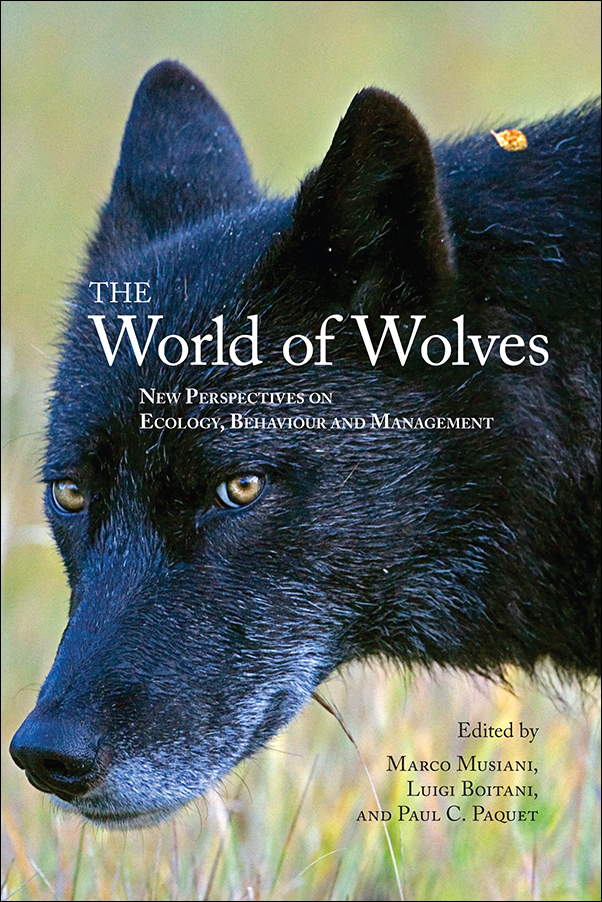
The World of Wolves: New Perspectives on Ecology, Behaviour, and Management
Edited by Marco Musiani, Luigi Boitani, and Paul Paquet
$34.95 CAD / $39.95 USD
352 pages, 92 illustrations
6 x 9 inches
Paperback: 978-1-55238-269-1
Library PDF: 978-1-55238-497-8
May 2010
A fresh and provocative examination of wolf and wildlife management, bringing together representative case studies from across the world in an essential work for anyone seeking a better understanding of wolves.
The grey wolf is one of the world’s most polarizing and charismatic species. Respected, adored, or held in awe by many as an icon of wilderness, wolves have also sparked fear and hatred when they have come into conflict with human presence. Not surprisingly, they are one of the most intensively studied mammalian species in the wild.
The World of Wolves offers a fresh and provocative look at current trends in wolf and wildlife management. Representative case studies, from geographically and culturally diverse areas of the world, highlight the existing interconnections between wolves, their prey, their habitat, their ecosystems and people, and the role of science in policy formation and wolf management. In addition, the studies involve many issues (for example, population genetics and livestock husbandry practices) that are entry points into larger aspects of ecology and evolution.
This book will appeal to conservationists, scientists, wildlife managers, and anyone seeking a better understanding of wolves and their co-existence with us.
Marco Musiani is an associate professor of landscape ecology at the University of Calgary and is also affiliated with the University of Montana. He was born in Rome, the city of the famous she-wolf, and has conducted research and published internationally on wolf management.
Luigi Boitani is the head of the Department of Animal and Human Biology at the University of Rome and a leading authority on wolves. He has conducted an extended series of research and conservation projects on the Italian wolf population, which has recovered dramatically in the last thirty years. He has authored more than two hundred peer-reviewed scientific publications and eight books.
Paul Paquet is an adjunct professor with the Faculties of Biology and Environmental Design at the University of Calgary. Dr. Paquet has studied wolves for more than thirty-five years and is considered an authority on carnivore ecology, with international research experience. He has published more than a hundred peer-reviewed articles and was the founder and director of the Central Rockies Wolf Project in Canmore, Alberta.
List of Tables
List of Figures
Biographies of Editors, Contact Authors and Artists
Acknowledgements
Introduction: The Key Role Played by Wolves in Community Ecology and Wildlife Management
Section I: Re-Discovering the Role of Wolves in Natural and Semi-Natural Ecosystems
Recent Advances in Population Genetics of Wolf-Like Canids
Robert K. Wayne
What, if anything, is a Wolf?
Raymond Coppinger, Lee Spector, and Lynne Miller
Wolf Community Ecology: Ecosystems Effect of Recovering Wolves in Banff and Yellowstone National Parks
Mark Hebblewhite and Doug W. Smith
Will the Future of Wolves and Moose Always Differ from our Sense of Their Past?
John A. Vucetich, Rolf O. Peterson, and M.P. Nelson
Section II: Wolves’ Role in Wildlife Management Planning: Human Impacts in Protected Wolf Populations, Hunting and Removal of Wolves
Influence of Anthropogenically Modified Snow Conditions on Wolf Predatory Behaviours
Paul C. Paquet, Shelley Alexander, Steve Donelon, and Carolyn Callaghan
The Recolonizing Scandinavian Wolf Population: Research and Management in Two Countries
Olof Liberg, Ake Aronson, Scott M. Brainerd, Jens Karlsson, Hans-Christian Pedersen, Hakan Stand, and Petter Wabakken
Synthesizing Wolf Ecology and Management in Easter Europe: Similarities and Contrasts with North America
Wlodzimierz Jedrzzejewski, Bogumila Jedzejewska, Zante Andersone-Lilley, Linas Balciauskas, Peep Mannil, Janis Ozolins, Vadim E. Sidorovich, Guana Bagrade, Marko Kubarsepp, Aivars Ornicans, Sabina Nowak, Alda Pupila, and Agrita Zunna
Wolf Ecology and Management in Northern Canada: Perspectives from a Snowmobile Wolf Hunt
H. Dean Cluff, Paul C. Paquet, Lyle R. Walton, and Marco Musiani
Livestock Husbandry Practices Reduce Wolf Depredation Risk in Alberta, Canada
Tyler Muhly, C. Cormack Gates Carolyn Callaghan, and Marco Muisani
Literature Cited
Colour Photos of Wild Wolves
Index
Buy this book.
—Pat Goodman, The Wolf Park News
Imagine sitting in front of a warm wood stove, an ancient yellow lab at your feet, to read a book about wolves—only to learn that there may be, in fact, no such thing as a wolf. And at the same time, that your lab, as fearful and unlethal a mammal as evolution could concoct, may in fact be a wolf. Such are the mysteries and delights to be found in The World of Wolves …
—Jeff Gailus, AlbertaViews